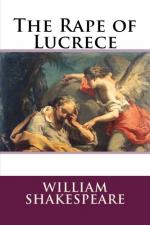|
This section contains 6,303 words (approx. 22 pages at 300 words per page) |

|
SOURCE: Dubrow, Heather. “A Mirror for Complaints: Shakespeare's Lucrece and Generic Tradition.” In Renaissance Genres: Essays on Theory, History, and Interpretation, edited by Barbara Kiefer Lewalski, pp. 399-417. Cambridge, Mass.: Harvard University Press, 1986.
In the following essay, Dubrow contends that The Rape of Lucrece contains an implicit criticism of the values and conventions of the complaint poem style.
Scholars typically dismiss both Venus and Adonis and The Rape of Lucrece as mere literary samplers, works in which an undiscriminating preoccupation with rhetorical display precludes a sustained concern for other issues, be they formal, psychological, or moral. According to such interpretations, Shakespeare's overriding concern is to cram as many tropes as possible into these poems, even at the expense of their overall structure. Thus one critic, lamenting the absence of subtle characterization in either poem, observes, “it is brilliance of the surface which has priority.”1 Rooted in a preconceived...
|
This section contains 6,303 words (approx. 22 pages at 300 words per page) |

|


